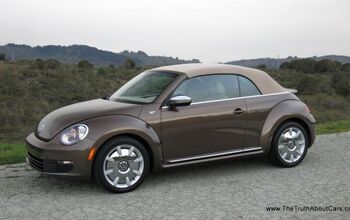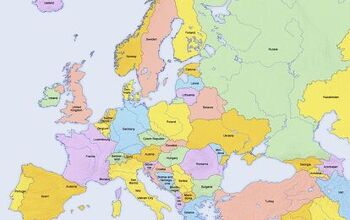European New Car Sales: Worst February Of The Millennium

Now, it is beginning to hurt: The European new car market crashed in February. According to data released by the European manufacturers’ association ACEA, new car sales were down 9.7 percent in February. Two months into the year, car sales in the EU are down 8.3 percent from the same period a year earlier.
The harmless looking percentages hide the fact that this February was the worst of the millennium. Only 888,878 units changed hands in the EU27 in February, the lowest level since comparing months made sense (going back further is futile, the EU was much smaller then…) Even during carmageddon, Europe had not seen a February as bad as this one.
EU basket cases Greece and Portugal saw their new car sales nearly halved. These are relatively unimportant markets, by now, tiny Luxemburg has more car sales than Greece. If Greece would leave the EU, it would not even register in the car statistics. What hurts much more is the deterioration of the volume markets. France is down 20.2 percent, not boding well for PSA and Renault. Italy is down 18.9 percent, putting pressure on Fiat. Flat sales in Germany spared Europe a double digit tanking.
February %ShareUnitsUnits% Chg’12’11’12’1112/11ALL BRANDS888,878984,010-9.7VW Group23.722.0211,018216,582-2.6VOLKSWAGEN12.911.8114,240116,273-1.7AUDI4.84.543,09344,354-2.8SEAT2.02.117,84620,217-11.7SKODA4.03.635,71135,695+0.0Others0.00.012843+197.7PSA Group13.014.1115,690139,096-16.8PEUGEOT6.77.759,77375,590-20.9CITROEN6.36.555,91763,506-12.0RENAULT Group9.511.384,620111,341-24.0RENAULT7.69.567,36193,129-27.7DACIA1.91.917,25918,212-5.2FORD7.47.366,00171,673-7.9GM Group8.18.572,43784,075-13.8OPEL/VAUXHALL6.57.257,54271,201-19.2CHEVROLET1.71.314,87612,800+16.2GM (US)0.00.01974-74.3FIAT Group7.37.964,90977,943-16.7FIAT5.25.745,88956,330-18.5LANCIA/CHRYSLER1.00.98,8218,567+3.0ALFA ROMEO0.91.17,85511,167-29.7JEEP0.20.12,0791,308+58.9Others0.00.1265571-53.6BMW Group5.34.947,48948,187-1.4BMW4.34.138,08339,894-4.5MINI1.10.89,4068,293+13.4DAIMLER4.94.243,15941,399+4.3MERCEDES4.33.737,96935,946+5.6SMART0.60.65,1905,453-4.8TOYOTA Group3.94.134,89840,726-14.3TOYOTA3.84.033,35839,852-16.3LEXUS0.20.11,540874+76.2NISSAN3.43.429,82233,215-10.2HYUNDAI3.42.929,97328,325+5.8KIA2.51.722,13416,924+30.8VOLVO CAR CORP.1.81.715,63516,579-5.7SUZUKI1.11.410,09613,766-26.7MAZDA0.90.98,3529,294-10.1JAGUAR LAND ROVER Group0.80.46,7864,396+54.4LAND ROVER0.70.45,8083,497+66.1JAGUAR0.10.1978899+8.8HONDA0.81.27,44511,418-34.8MITSUBISHI0.60.95,5868,693-35.7OTHER1.41.112,82810,378+23.6On the manufacturer front, the Volkswagen Group solidified its leadership. Its market share climbed 1.7 percent to 23.7 percent in February. PSA lost 1.1 percent, Renault lost 1.8 percent, Fiat lost 0.6 percent. These makers not only have maximum exposure to their home markets. They also are heavy in the troubled south of Europe and are weak in developing markets.
The GM Group is holding its own, losing only 0.4 percent of share. A 0.8 percent loss at Opel was buffered by a 0.4 percent gain in market share of Chevrolet. It looks like GM is busy propping up Chevrolet at the expense of Opel/Vauxhall. Two month into the year, Opel’s sales have dropped 20.3 percent, whereas Chevrolet has gained 22 percent.
Toyota and Nissan lose, Hyundai and Kia gain. Hyundai is now in spitting distance from Nissan, and not too far from Toyota.
Full data can be downloaded here as PDF and here as Excel spreadsheet.

Bertel Schmitt comes back to journalism after taking a 35 year break in advertising and marketing. He ran and owned advertising agencies in Duesseldorf, Germany, and New York City. Volkswagen A.G. was Bertel's most important corporate account. Schmitt's advertising and marketing career touched many corners of the industry with a special focus on automotive products and services. Since 2004, he lives in Japan and China with his wife <a href="http://www.tomokoandbertel.com"> Tomoko </a>. Bertel Schmitt is a founding board member of the <a href="http://www.offshoresuperseries.com"> Offshore Super Series </a>, an American offshore powerboat racing organization. He is co-owner of the racing team Typhoon.
More by Bertel Schmitt
Latest Car Reviews
Read moreLatest Product Reviews
Read moreRecent Comments
- Carson D Just don't be the whistleblower who reports on the falsification of safety data. That's a deadly profession.
- Carson D I'd have responded sooner, but my computer locked up and I had to reboot it.
- Todd In Canada Mazda has a 3 year bumper to bumper & 5 year unlimited mileage drivetrain warranty. Mazdas are a DIY dream of high school auto mechanics 101 easy to work on reliable simplicity. IMO the Mazda is way better looking.
- Tane94 Blue Mini, love Minis because it's total custom ordering and the S has the BMW turbo engine.
- AZFelix What could possibly go wrong with putting your life in the robotic hands of precision crafted and expertly programmed machinery?



































Comments
Join the conversation
It's SHTF time in China, too: http://globaleconomicanalysis.blogspot.com/2012/03/curbs-needed-to-avoid-china-property.html Though the global debt bubble was encouraged and constructed -- and now denied -- by governments everywhere, the party is over.
for all the hype about Brazil, its economy only grew by 2.7% in 2011. http://blogs.ft.com/beyond-brics/2012/03/06/snap-brazil-gdp-falling-behind/ South Africa cut its GDP growth forecast to 2.7% for 2012, far below levels needed to create jobs http://af.reuters.com/article/commoditiesNews/idAFJ8E7JM02220120222 Russia is about the same. the only BRICS economy not showing gloom and doom right now is India. the nice thing about the US economy is that it isn't as export dependant for growth. Exports to Europe only represent 3% of the economy; a recession in Europe would not cause one in the US unless it creates another bnaking crisis. http://www.reuters.com/article/2012/03/15/us-usa-economy-instantphilly-idUSBRE82E0QO20120315